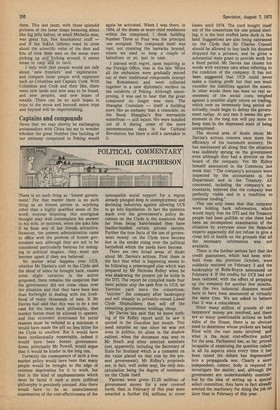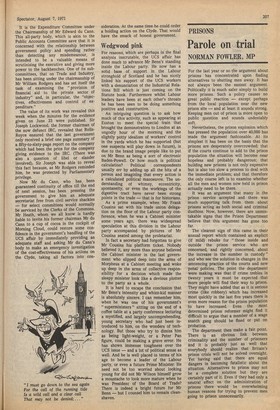POLITICAL COMMENTARY HUGH MACPHERSON
There is no such thing as honest government.' For that matter there is no such thing as an honest person in anything other than a highly qualified sense of the word. Anyone disputing this unoriginal thought may well contemplate his answer to his wife, or mistress, when she asks him if he finds any of her friends attractive. However, the present administration came to office with the promise of honest government and, although they are not to be considered particularly heinous for indulging in political slogans, they must not become upset if they are believed.
No matter what happens over UCS, whether Mr Davies's visit to the Clyde and the sheaf of notes he brought back, causes some slight variation in the action proposed, there remains the suspicion that the government did not come clean over the situation and that they have been less than forthright in dealing with the livelihood of many thousands of men. If Mr Davies had said that this was to be a test case for his lame duck philosophy, that market forces must be allowed to operate, and that economic investment for social reasons must be reduced to a minimum it would have made the pill no less bitter for the Clyde to swallow. But it would have been intellectually respectable, indeed it would have been honest government. Some, principally Mr Powell, would argue that it would be kinder in the long run.
Certainly the consequence of such a free market policy would have been that many people would be brought to the edge of extreme deprivation for it to work, but that is the kind of unpleasantness which must be faced if such a stern political philosophy is genuinely pursued. Also there would have to be an unsentimental examination of the cost-effectiveness of the inescapable social support for a region already plunged deep in unemployment and declining industries against allowing UCS to go into liquidation. In fact the question mark over the government's policy decisions on the Clyde is the suspicion that far from being hard-headed they have feather-bedded certain private sectors. Further the true facts of the use of government money, on the Clyde have become lost in the smoke rising over the political battlefield which the yards have become.
There are two broad areas of doubt about Mr Davies's actions. First there is the fact that what is happening seems to be following a prearranged plan which was prepared by Mr Nicholas Ridley when he was shadowing the present job he holds in the DTI. The report he compiled made four basic points: stop the cash flow to UCS; let Yarrows yard leave the consortium; ' butcher ' the company after bankruptcy and sell cheaply to privately-owned Lower Clyde Shipbuilders; then sell off the remaining government holdings cheap.
Mr Davies has said that he knew nothing of the Ridley report until he saw it quoted in the Guardian last month. This need surprise no one since he was not even in politics, let alone in the shadow cabinet, when the document was sent to Mr Heath and other selected members (not, apparently, including the Secretary of State for Scotland which is a comment on the value placed on that role by the present government). Mr Ridley's proposals are, in fact, well under way, the only miscalculation being the degree of resistance on the Clyde itself.
Yarrows were given E1.25 millions of government money for a new covered berth, then in February of this year were awarded a further e4i millions to cover losses until 1974. The yard bought itself out of the consortium for one pound sterling; it is the best stuffed lame duck in the land. Suggestions are also being canvassed on the Clyde that Sir Charles Connell should be allowed to buy back his doomed shipyard for a pittance, and be given a substantial state grant to provide work for a fixed period. Mr Davies has chosen his words with extreme care when referring to the condition of the company. It has not been suggested that UCS could never make a trading profit but that one must consider the liabilities against the assets. In other words there has been no real assessment of the social costs weighed against a possible slight return on trading, which over an immensely long period admittedly, could begin to defray the government outlay. At any rate it seems the government in the long run will pay more to keep men in the depressed state of being unemployed.
The second area of doubt about Mr Davies's actions concern once more the efficiency of his mammoth ministry. He has maintained all along that the situation was suddenly sprung on the government even although they had a director on the board of the company. Yet Mr Ridley himself announced in the Commons last week that: "The company's accounts were inspected by the accountants in the Department and in the Treasury. All concerned, including the company's accountants, believed that the company was perfectly viable and in a condition to continue trading."
'This can only mean that that company were holding back information, which would imply that the DTI and the Treasury people had been gullible or else there had been an incompetent examination of the situation by everyone since the financial experts apparently did not refuse to give a clean bill of health on the grounds that all the necessary information was not available.
There is the further serious fact that the credit guarantees, which had been withheld from the previous October, were suddenly restored on February 3 and the bankruptcy of Rolls-Royce announced on February 4. If the credits for UCS had not been restored, with the effect of propping up the company for another few months, then the two industrial disasters would have to have been announced at virtually the same time. We are asked to believe that it was a coincidence.
Since many million of pounds of the taxpayers' money are involved, and there are so many questionable actions on both sides of the House, there is an obvious need to determine whose pockets are being filled with the vast sums involved and what is the most cost-effective policy for the area. Parliament has, so far, proved incapable of examining the question calmlY in all its aspects since every time it has been raised the debate has degenerated into a propaganda war. Clearly a more independent, calmer, body is required to investigate the matter, and, although the government are understandably unattracted by the idea of setting up a special select committee, they have in fact alreadY erected the machinery for doing the job co later than in February of this year.
It is the Expenditure Committee under the Chairmanship of Mr Edward du Cann. This all-party body, which is akin to the Public Accounts Committee save that it is concerned with the relationship between government policy and spending rather than detecting any misdemeanour, is intended to be a valuable means of scrutinising the executive and giving more power to the backbenches. One of its subcommittees, that on Trade and Industry, has been sitting under the chairmanship of Mr William Rodgers and has set itself the task of examining the " provision of financial aid to the private sector of industry" and, in particular, the "objectives, effectiveness and control of expenditure."
The value of its work was revealed this week when the minutes for the evidence given on June 23 were published. Sir Joseph Lockwood, the former chairman of the now defunct IRC, revealed that RollsRoyce ensured that the last government only received a brief one page summary of a fifty-to-sixty-page report on the company which had been the price for the company giving evidence to the IRC. (There was also a question of libel or slander involved). Sir Joseph was able to reveal this fact because, as Mr Rodgers reminded him, he was protected by Parliamentary privilege. Now Mr du Cann, who has, been guaranteed continuity of office till the end of next session, has been pressing the government to give him an adequate secretariat free from civil service shackles — for select committees would normally be serviced by the Clerks of the Commons. Mr Heath, whom we all know is hardly liable to invite his former chairman Mr du Cann to a cup of cocoa in the cockpit of Morning Cloud, could restore some confidence in the government's handling of the UCS affair by immediately providing an adequate staff and asking Mr du Cann's • body to make an emergency investigation of the cost-effectiveness of his actions on the Clyde, taking all factors into con sideration. At the same time he could order a holding action on the Clyde. That would have the smack of honest government.



































 Previous page
Previous page